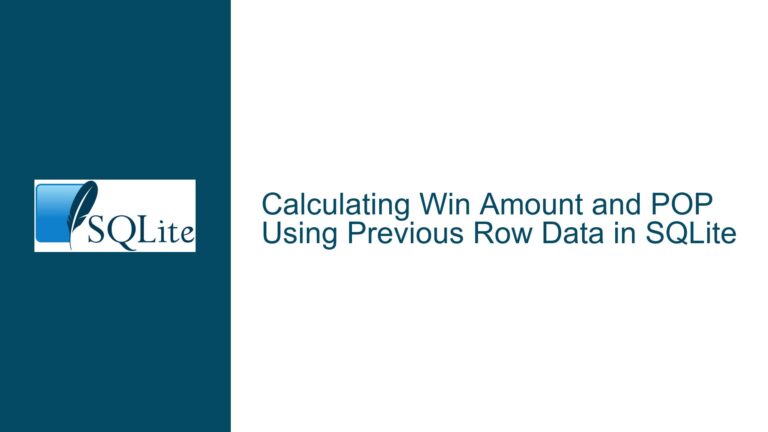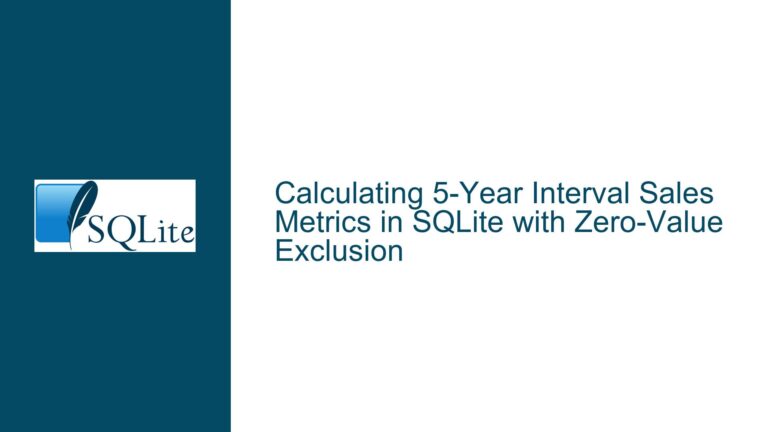Unexpected Function Execution in SQLite CASE Expressions with SQLITE_DETERMINISTIC Flag
SQLITE_DETERMINISTIC Flag Causing Unnecessary Function Calls in CASE Expressions
The core issue revolves around the unexpected execution of user-defined functions within SQLite’s CASE expressions when the SQLITE_DETERMINISTIC flag is set. Specifically, functions marked as deterministic are being called even when the CASE expression’s condition evaluates to False, leading to unnecessary computations and potential side effects. This behavior is particularly problematic in scenarios where the function has side effects or is computationally expensive. The issue was identified and addressed in SQLite version 3.32.0, but understanding the underlying causes and workarounds is essential for developers working with earlier versions or those who need to ensure backward compatibility.
The SQLITE_DETERMINISTIC flag is used to indicate that a function will always return the same output given the same input and database state. This flag allows SQLite to optimize queries by caching results or avoiding redundant computations. However, in the context of CASE expressions, this optimization can lead to unintended consequences, as SQLite may precompute or evaluate functions even when they are not needed due to the logical structure of the CASE statement.
Interrupted Write Operations Leading to Index Corruption
The root cause of this issue lies in SQLite’s query optimization strategies, particularly how it handles deterministic functions within conditional expressions. When a function is marked with the SQLITE_DETERMINISTIC flag, SQLite assumes that the function’s output is consistent and can be safely cached or precomputed. This assumption allows the query planner to optimize execution by evaluating functions earlier than strictly necessary, even if the result is never used due to the logical flow of the CASE expression.
For example, consider the following CASE expression:
CASE WHEN False THEN MyFunction() END
In this case, MyFunction() should not be called because the condition False ensures that the THEN clause is never reached. However, if MyFunction() is marked as deterministic, SQLite may evaluate it during query planning or execution, regardless of the condition’s outcome. This behavior is a direct result of the SQLITE_DETERMINISTIC flag’s influence on the query optimizer.
The issue is further complicated by the fact that SQLite’s handling of CASE and COALESCE expressions was revised in version 3.32.0 to ensure short-circuit evaluation. Prior to this change, SQLite would sometimes evaluate all branches of a CASE expression, even when logically unnecessary. This change addressed the problem by ensuring that functions are only called when their results are actually needed.
Implementing PRAGMA journal_mode and Database Backup
To address this issue, developers have several options depending on their specific requirements and constraints. The most straightforward solution is to upgrade to SQLite version 3.32.0 or later, where the problem has been resolved. However, for those unable to upgrade, alternative strategies can be employed.
One effective workaround is to omit the SQLITE_DETERMINISTIC flag when registering the function. Without this flag, SQLite will not attempt to optimize the function’s execution, ensuring that it is only called when necessary. For example:
sqlite3_create_function(db, "MyFunction", 1, SQLITE_UTF8, NULL, &MyFunction, NULL, NULL);
This approach ensures that MyFunction() is only evaluated when explicitly required by the CASE expression’s logic.
Another strategy is to refactor the query to avoid relying on the SQLITE_DETERMINISTIC flag. This can be achieved by breaking down complex CASE expressions into multiple queries or using temporary tables to store intermediate results. For instance, instead of embedding a function with side effects directly within a CASE expression, the function can be called in a separate query, and its result stored in a variable or temporary table for later use.
For developers who must use the SQLITE_DETERMINISTIC flag, careful testing and validation are essential to ensure that functions are not being called unnecessarily. This can be done by adding logging or debugging statements within the function to track its execution. Additionally, developers should review their query plans using the EXPLAIN QUERY PLAN statement to identify any unexpected optimizations that might lead to premature function evaluation.
In scenarios where the function’s side effects are critical to the application’s logic, it may be necessary to redesign the database schema or application logic to avoid relying on side effects within SQL queries. This can involve moving side-effect logic to the application layer or using triggers to manage state changes in a more controlled manner.
Finally, developers should consider implementing robust backup and recovery mechanisms to mitigate the risks associated with unexpected function execution. This includes using SQLite’s PRAGMA journal_mode to enable write-ahead logging (WAL) or other journaling modes that provide better crash recovery. Regular database backups should also be performed to ensure that data can be restored in the event of corruption or other issues.
In conclusion, the unexpected execution of deterministic functions within CASE expressions is a nuanced issue that requires careful consideration of SQLite’s query optimization strategies. By understanding the underlying causes and employing appropriate workarounds, developers can ensure that their applications behave as expected while maintaining the performance benefits of deterministic functions. Upgrading to SQLite 3.32.0 or later is the most effective solution, but alternative strategies can be used when upgrading is not feasible. Regardless of the approach, thorough testing and validation are essential to ensure the reliability and correctness of SQLite-based applications.






